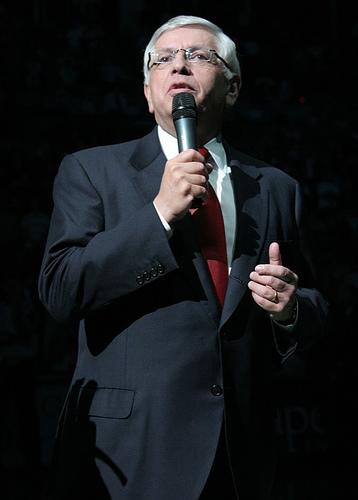NBA season in jeopardy as negotiations continue
David Stern (Photo by Cody Mulcahy, via Wikimedia Commons, cc-by-sa)
Story from Here and Now. Listen to audio above for full report.
If you’re an NBA fan, you’ll be waiting at least two more weeks — and quite likely much longer than that — for this season to get underway.
Late Monday night, NBA Commissioner David Stern canceled the first two weeks of NBA games. That move came on the heels of an hours-long, and ultimately fruitless, negotiation session between NBA players and team owners. This summer, NBA owners locked the players out while owners seek a new contract with players that will give the players a smaller portion of basketball income.
Owners say it’s a necessary step to get some franchises back on the side of making money.
Gabriel Feldman, director of the Tulane University Sports Law Program, says this is a common tactic used by sports owners to get players to do what they want.
“This is a weapon that David Stern is using on behalf of management…to prevent employees (players) from working and getting paid, to put pressure on them to give you concessions and get a better deal in the collective bargaining agreement,” Feldman said.
Feldman says two key issues divide owners and players. The first is how to split revenue between players and owners. Right now, players get 57 percent of revenue, while owners want to reduce players share to 47 percent. The difference is about $2 billion over the life of the contract.
“It’s projected to be about $4 billion in the upcoming season,” Feldman said. “The estimate is they may be losing $350 million by canceling the first two weeks of the season, but that’s a small portion when you’re talking about $4 billion per year over 10 years.”
The second issue is over the salary cap. The owners want a hard salary cap, while players want a soft salary cap, like the one that exists today.
Players and owners aren’t the only ones who are losing. Feldman said there’s a lot of collateral damage including people who work for arenas, for concessions and even people working in the front office of the teams, who may be laid off. Businesses who rely on ancilary activies around the games also stand to lose.
But Feldman is optimistic that there will be a resolution to this stalemate.
“There’s just too much money at stake,” he said.
—————————————————–
“Here and Now” is an essential midday news magazine for those who want the latest news and expanded conversation on today’s hot-button topics.
The story you just read is accessible and free to all because thousands of listeners and readers contribute to our nonprofit newsroom. We go deep to bring you the human-centered international reporting that you know you can trust. To do this work and to do it well, we rely on the support of our listeners. If you appreciated our coverage this year, if there was a story that made you pause or a song that moved you, would you consider making a gift to sustain our work through 2024 and beyond?
